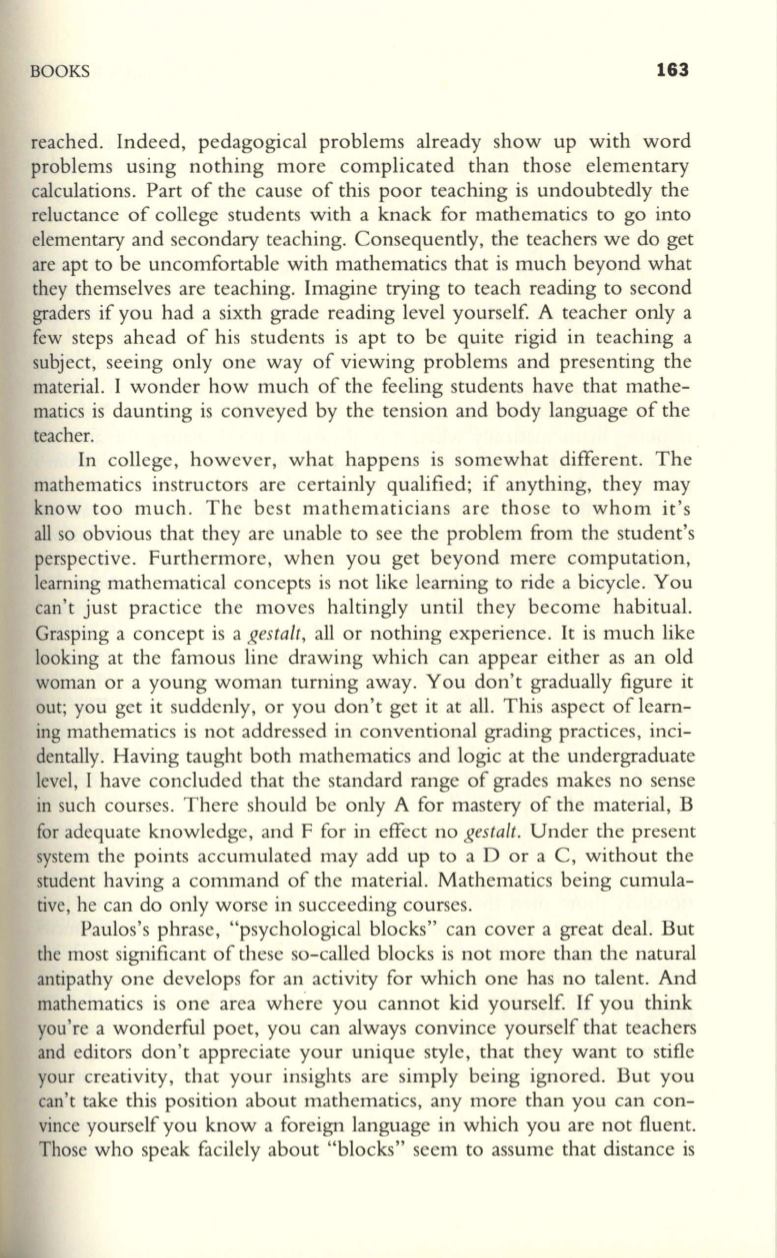
BOOKS
163
reached. Indeed, pedagogical problems already show up with word
problems using nothing more complicated than those elementary
calculations . Part of the cause of this poor teaching is undoubtedly the
reluctance of college students with a knack for mathematics to go into
elementary and secondary teaching. Consequently, the teachers we do get
are apt to be uncomfortable with mathematics that is much beyond what
they themselves are teaching. Imagine trying to teach reading to second
graders if you had a sixth grade reading level yourself. A teacher only a
few steps ahead of his students is apt to be quite rigid in teaching a
subject, seeing only one way of viewing problems and presenting the
material. I wonder how much of the feeling students have that mathe–
matics is daunting is conveyed by the tension and body language of the
teacher.
In college, however, what happens is somewhat different. The
mathematics instructors are certainly qualified; if anything, they may
know too much . The best mathematicians are those to whom it's
all
so obvious that they are unable to see the problem from the student's
perspective. Furthermore, when you get beyond mere computation,
learning mathematical concepts is not like learning to ride a bicycle. You
can't just practice the moves haltingly until they become habitual.
Grasping a concept is a
gestalt,
all or nothing experience. It is much like
looking at the famous line drawing which can appear either as an old
woman or a young woman turning away. You don't gradually figure it
out; you get it suddenly, or you don't get it at all. This aspect of learn–
ing mathematics is not addressed in conventional grading practices, inci–
dentally. Having taught both mathematics and logic at the undergraduate
level, I have concluded that the standard range of grades makes no sense
in such courses. There should be only A for mastery of the material, B
for adequate knowledge, and F for in effect no
gestalt.
Under the present
system the points accumulated may add up to a D or a C, without the
student having a command of the material. Mathematics being cumula–
tive, he can do only worse in succeeding courses.
Paulos's phrase, "psychological blocks" can cover a great deal. But
the most significant of these so-called blocks is not more than the natural
antipathy one develops for an activity for which one has no talent. And
mathematics is one area where you cannot kid yourself. If you think
you're a wonderful poet, you can always convince yourself that teachers
and editors don't appreciate your unique style, that they want to stifle
your creativity, that your insights are simply being ignored. But you
can't take this position about mathematics, any more than you can con–
vince yourself you know a foreign language in which you are not fluent.
Those who speak facilely about "blocks" seem to assume that distance is


